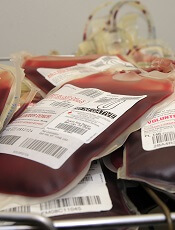
Photo courtesy of UAB Hospital
The National Institute for Health and Care Excellence (NICE) has issued its first guideline on blood transfusions.
The agency said that national audits on the use of blood in England have suggested that at least one-fifth of transfusions are unnecessary.
So NICE developed a guideline to provide recommendations on when a transfusion should be used and when alternatives should be considered.
“This guideline will ensure blood products are used safely and efficiently,” said Mark Baker, MD, director of clinical practice at NICE.
“Hundreds of thousands of people receive blood transfusions every year in England and Wales. We must do all we can to ensure that their experience is a safe one. We know that practice is improving, and, with this guideline, we want to drive things even further so we get closer to transfusions being completely risk-free and people are spared from avoidable harm.”
The guideline contains recommendations to help hospitals reduce the need for transfusions wherever possible. This includes encouraging clinicians to prescribe tranexamic acid, which can be given to patients undergoing surgery to stop them losing too much blood.
The guideline also calls for hospitals to consider using a system that electronically identifies patients to make the transfusion process safer and more efficient.
Electronic patient identification systems prompt staff to carry out key steps in the correct order and ensure that transfusions are given to the right patients through scanning of barcodes on patient wristbands and blood component containers.
“Electronic systems make it easy for staff to do the right thing every time and avoid errors,” said Mike Murphy, MD, a consultant hematologist at Oxford University Hospitals and chair of the committee that developed the guideline.
“They can also provide ‘decision support’ for doctors when they are ordering blood and promote the restrictive use of blood. The guideline also, importantly, highlights the benefits of the routine use of tranexamic acid in patients undergoing surgery. Routine implementation of these measures in the [National Health Service] will make best use of a valuable resource, be safer for patients, and save money for hospitals.”
The guideline is available on the NICE website. NICE has also published a guide for members of the public so they know what care they should expect to receive.


